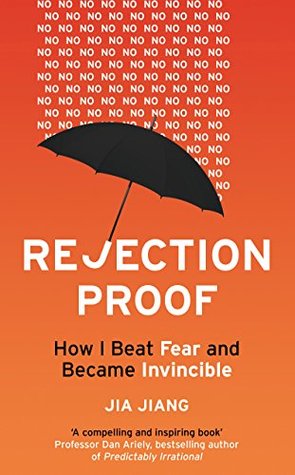More on this book
Community
Kindle Notes & Highlights
by
Jia Jiang
Read between
January 17 - October 3, 2020
Washington Post columnist Gene Weingarten staged an intriguing experiment that quickly went viral. He asked Joshua Bell, a Grammy Award–winning violinist and conductor, to play his violin in a busy DC metro station dressed like a normal street fiddler.
During his forty-five-minute subway performance, 1,097 people passed by the spot where Bell was playing. Only seven stopped to listen, and only one recognized Bell.
no one can deny the fact that the performance was targeted at the wrong audience.
LESSONS
1. Give My “Why”:
2. Start with “I”:
3. Acknowledge Doubts:
4. Target the Audience:
CHAPTER 8 GIVING A NO
But I was learning a tremendous amount about psychology, negotiation, and persuasion.
Being the person doing the rejection didn’t feel much better to me than being on its receiving end.
I realized that if I didn’t get a handle on my reluctance to reject people, then I might end up wanting to quit as well.
I was afraid they would reject me because of my rejection.
There were good rejections and bad rejections. Some of the people who had rejected me had been harsh and dismissive, but others had said no with such finesse and kindness that they managed to make me like them despite their nos.
100 DAYS OF REJECTION: EXCHANGE SERVICES WITH A PERSONAL TRAINER
My goal was to get a personal trainer to give me an hour of free training without me joining his gym. In exchange, I would offer to spend an hour teaching him everything I’d learned about entrepreneurship and blogging.
He wasn’t dismissive, even though my request held no interest for him. He heard me out, and showed that he was taking me seriously by giving me real reasons why the request wasn’t going to work. He made me feel valued by pulling out his problem-solving skills and doing what he could to help me get what I wanted.
Jordan had delivered a “perfect rejection.”
PATIENCE AND ...
This highlight has been truncated due to consecutive passage length restrictions.
Being patient and respectful when
saying no is such a simple concept.
the difference between a good interaction and a bad one isn’t always so dramatic. Sometimes the two are separated by nothing but a smile.
Showing patience and respect can soften the blow of rejection, and sometimes even earn the other person’s respect and understanding.
Moral of the story: If you have to reject someone, do it nicely.
BE DIRECT
A lot of people have the tendency to give indirect, sugarcoated rejections. They usually come in two forms: big setups and yes-buts.
With “big setups,” rejectors spend a long time explaining the reason for their rejection before they actually deliver it. Companies are notoriously good at this.
“Yes-buts” happen when the rejector verbally acknowledges or even validates a request, then uses the word but or unfortunately to deliver the rejection.
book Conversation Transformation,
Ben E. Benjamin
the danger of “yes-buts.” Not only do they send mixed messages, he says, but also they make the idea difficult for the rejectee’s brain to proces...
This highlight has been truncated due to consecutive passage length restrictions.
When you deliver a rejection to someone, give the bad news quickly and directly.
OFFER ALTERNATIVES
100 DAYS OF REJECTION: SPEAKING OVER COSTCO’S INTERCOM
a great way to reject someone: by offering an alternative.
the person rejecting me was making it clear that he was rejecting my request—not rejecting me as a person.
They can’t separate the rejection from who they are as a person. It takes practice and conscious thinking to separate the two and not take things personally.
LESSONS
1. Patience and Respect:
2. Be Direct:
3. Offer Alternatives:
CHAPTER 9
FINDING UPSIDE
Friedrich Nietzsche famously wrote: “That which does not kill us makes us stronger.”
MOTIVATION
One of the biggest upsides of rejection is that it can serve as motivation.
The relationship you have with a rejection can be negative or positive, and it all depends on which way you spin it for yourself.
Michael Jordan’s 2009 Basketball Hall of Fame induction speech was anything but boring.
he consistently used rejection as motivation during his career and even into retirement.
successful people convert rejection into personal fuel.


